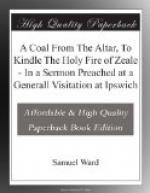[Sidenote: Rom. 14. 10.]
In quarrells of this nature Paul spends his zeale, not in partaking but in parting the fray, beating downe the weapons on both sides: Who art thou that judgest? who art thou that condemnest thy brother? as if hee should say, The matters are not Tanti, wee have made the Divell too much sport already; who threw in these bones to set us together by the eares, whilst hee lets in the common Enemy upon us. Charitie, Charitie, is the builder of Churches: Strife about trifles, hath wasted many famous ones, and placed the temples of Mahomet, where the golden candle-sticke was wont to stand. Wee pitty the former ages, contending about leavened and unleavened bread, keeping of Easter, fasting on Sundayes, &c. The future ages, will do the like for us. Oh that the Lord would put into the hearts both of the governours & parties to these quarrells, once to make an end of these Midianitish warrs; that wee might joyntly powre out the vialls of our zeale upon the throne of the beast.
Thus have you heard the errors and counterfets of zeale, through whose sides, and upon the backe of which, divers of the malicious world use to beat those whom it hates, because their workes are better then their owne; injuriously concluding, that all Zelots are alike. Thus I have heard our Marchants complaine, that the set up blewes have made strangers loath the rich oaded blewes, onely in request; this is an olde sophisme. True judgement would teach us to conclude, that the best druggs have their adulterates; the most current coins their slipps; and that vertue which so many hypocrites put on, to grace themselves withall; is surely some rare and excellent jewell.
The third part.
The true Zelot, whose fervency is in the spirit, not in shew; in substance not in circumstance; for God, not himselfe; guided by the word, not with humours; tempered with charity, not with bitternesse: such a mans praise is of God though not of men: such a mans worth cannot bee set foorth with the tongues of men and Angells.
[Sidenote: Arguments of commendation.]
Oh that I had so much zeale, as to steep it in it owne liquour; to set it forth in it owne colours, that the Lord would touch my tongue with a coale from his Altar, that I might regaine the decayed credit of it, with the sons of men.
[Sidenote: 1. From God’s excellency whom zeale only becomes unworthily placed elsewhere.]
It is good to bee zealous in a good things: and is it not best, in the best? or is there any better then God, or the kingdome of heaven? Is it comely what ever we do, to do it with all our might? onely uncomely when wee serve God? Is meane and mediocrity, in all excellent Arts excluded, and onely to be admitted in religion? Were it not better to forbeare Poetry or Painting, then to rime or dawbe? and were it not better to bee of no religion, then to be colde




